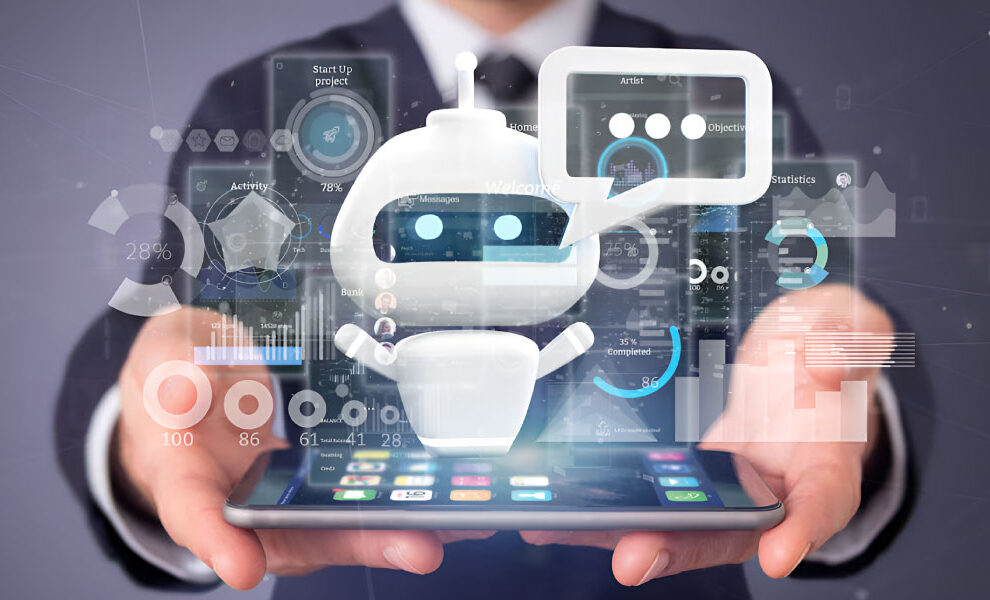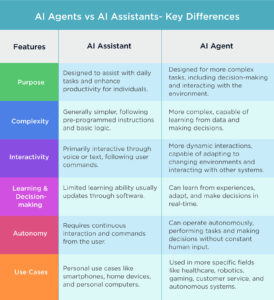Confused about AI agents and AI assistants? Understand how these technologies are different in complexity, autonomy, and use cases from each other. From helping us with tasks on our phones to performing complex functions in industries, AI is everywhere.
AI agents are used in self-driving cars and even in customer service. AI assistants make life easier with smart devices by setting reminders or by controlling them through the assistant’s commands. Both terms have relevance to technology, but they serve different purposes and work in their own unique way. Let’s understand the difference between AI Agents vs AI assistants.
What is an AI Assistant?
An AI assistant helps the user to perform their daily tasks in an easy way. It provides information and performs basic functions like setting reminders, sending messages, and answering questions by communicating with the user. These assistants perform simple actions. They are used in smartphones, smart speakers, and other smart devices. Example- Apple’s Siri, Amazon’s Alexa, and Google Assistant
Recent data shows that 97% of mobile users use AI voice assistants, and the number of digital voice assistants is expected to reach nearly 8.4 billion units by the end of 2024.
AI assistants simplify daily tasks by:
- Setting alarms or reminders
- Sending messages or making calls
- Giving weather updates
- Answering questions or providing information
- Controlling smart home devices
- Playing music or podcasts
Typically, AI assistants work to make life easier by taking care of day-to-day tasks, answering questions, and managing workloads. They do so by accepting voice commands and acting in response to predetermined orders.
What is an AI Agent?
An AI agent is more complex than an AI assistant. While an AI assistant will follow a given command, an AI agent has the ability to make decisions and learn from its experiences and act in a much more dynamic relationship with the environment. AI agents are often used in more complex applications, such as business settings, robotics, or gaming.
For example, a report states that 60% of large enterprises are expected to deploy AI agents by 2026 to enhance decision-making and operational efficiency.
Unlike AI assistants, AI agents can be more autonomous. They can perform any task without constant human guidance. An AI agent can analyze situations, make decisions on data, and take actions to achieve a goal.
Take video games as an example; AI agents control characters or enemies. These agents will determine the reaction of how they should act when the player issues a command. In the business world, AI agents can perform tasks such as customer service, data analysis, or even managing certain aspects of a supply chain.
Some examples of AI agents include:
- Self-driving cars, which use AI agents to navigate and make decisions on the road.
- Chatbots are used for customer service, where AI agents can understand customer inquiries and provide solutions.
- AI in gaming, where agents control characters or adapt the gameplay based on player actions.
AI Agents vs AI Assistants- Key Differences
Some of the key differences between AI agents vs AI assistants are as follows:
AI Agents vs AI Assistants: A Final Comparison
AI agents vs AI assistants are both tools meant to help us, they work in two different ways. AI assistants work on helping with day-to-day chores and making life simpler, while AI agents are much more advanced, and capable of higher-level decision-making, learning, and even interaction with the environment. This means that their autonomy, complexity, and what tasks they can be used for, differ. It helps us understand the technology behind these tools and how they can be used in various situations.
Check HiTechNectar to explore the future of AI!
FAQ
Q1. What is the difference between AI model and agent?
Answer: An AI model is a program that processes data and makes predictions or decisions. An AI agent is an AI system that can interact with its environment, learn, and take actions based on those decisions.
Q2. Mention the five types of agents in AI?
Answer: There are five types of AI agents:
Reactor agents: They respond to immediate situations.
Deliberator agents: Plan actions based on reasoning.
Learning agents: Learn over time.
Autonomous agents: Function without continuous human input.
Collaborative agents: Cooperate with other agents to achieve objectives.
Q3. Tell the difference between a chatbot and an AI assistant?
Answer: An AI assistant can help with tasks across multiple devices, like Siri or Alexa, while a chatbot is designed specifically to chat and answer questions, usually on websites or messaging apps. An AI assistant is more versatile.
Also Read:
A Quick Introduction to AI as a Service and its Impact
AI and Chatbots changing the Face of Digital Marketing



